Florida GOP operative admits role in ‘ghost’ candidate scheme that defeated utility-targeted Dem
A Republican consultant's deposition reveals he OK’d the plan to run a third-party candidate to defeat Florida Power & Light nemesis.
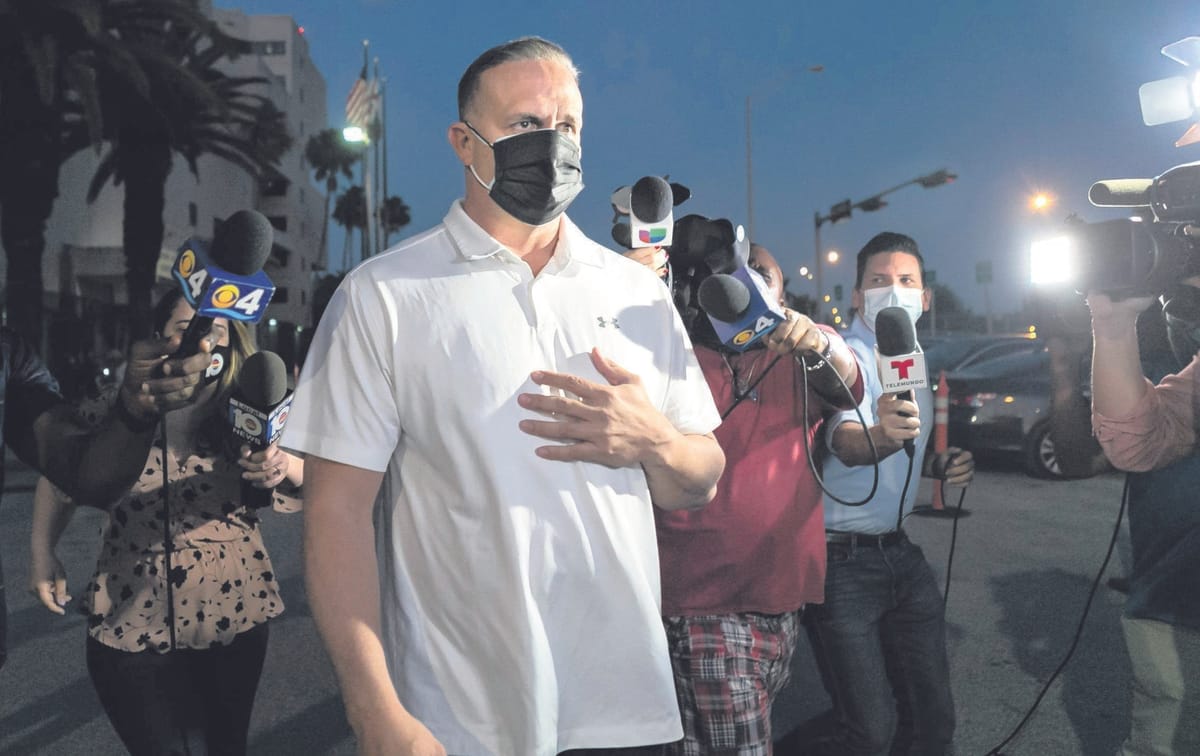
Published in the Miami Herald, Orlando Sentinel
For the first time, the lead consultant to Florida Senate Republicans has admitted to hiring a disgraced ex-senator and approving a dirty trick to recruit a third-party candidate to siphon votes from a South Florida Democrat.
The scheme succeeded. In 2020, Jose Javier Rodriguez, the Democrat targeted by the GOP and by Florida Power & Light, lost by 32 votes to Ileana Garcia, the founder of Latinas for Trump. A third-party candidate who didn’t campaign and who shared the same last name as Rodriguez drew over 6,000 votes.
Patrick Bainter, the Senate GOP’s chief consultant, told Miami’s chief public corruption prosecutor in a December deposition that he was the one who gave the green light to former state Sen. Frank Artiles to find third-party candidates to help defeat two Democrats.
“He said he thought that was something he could do and do well,” Bainter said. “Great. Go knock yourself out.” Bainter then had $100,000 transferred to a dark money non-profit Artiles controlled.
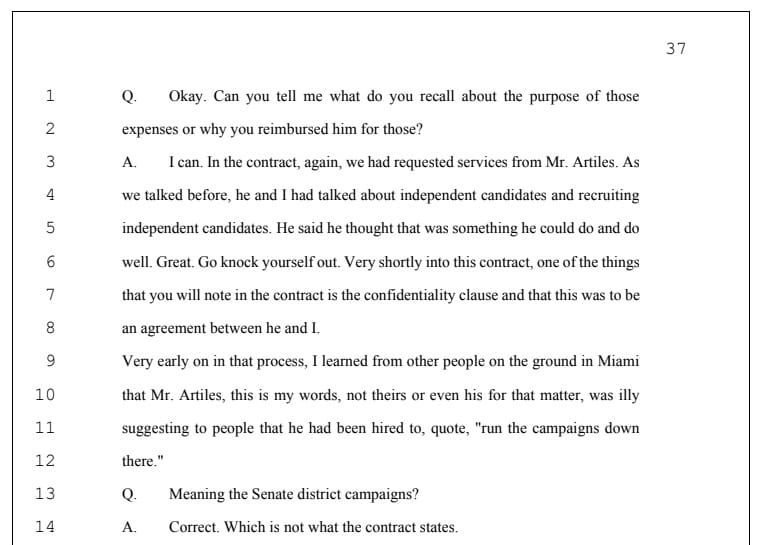
In March 2021, Artiles was arrested and charged with making over $45,000 in illegal and undeclared campaign contributions to Alex Rodriguez, the “ghost” candidate. Bainter said in the deposition that he did not direct how the money he sent Artiles was to be spent and was unaware of how Artiles used it.
But he did admit for the first time in the deposition that the District 37 ghost candidate was part of his 2020 campaign strategy on behalf of Senate Republicans. And Bainter acknowledged that Artiles had been seeking a consulting agreement with the Senate Republicans’ campaign arm shortly before signing on with Bainter.
Bainter’s description of his involvement in the scheme came in a deposition released by the Miami-Dade State Attorney's Office earlier this year in response to a public records request from Floodlight, a nonprofit newsroom that investigates the powerful interests stalling climate action.
It, along with other released documents, draws an increasingly strong line from the ghost candidate scandal of 2020 to Florida Senate Republicans. Rodriguez, the South Florida Democrat, also had other enemies. FPL, the nation’s largest utility, which had vowed to make his life a “living hell,” has been accused in a lawsuit by its shareholders of orchestrating the scheme.
The suit alleges that political consultants who worked closely with the utility's CEO and lobbying staff plowed FPL funds through a series of dark money groups “to prop up the ghost candidates.” The company has repeatedly denied the allegations and has moved to dismiss the suit.
“I supported the Republican Party who I knew was targeting this race,” former Florida Power & Light CEO Eric Silagy said in a June 2022 interview with Floodlight and other news outlets. Silagy resigned in January 2023, due, in part, to negative press coverage about FPL’s involvement in the scandal.
‘Ghost’ candidates boost GOP majority
The plot was sprawling. In all, three spoiler candidates ran in three districts, benefiting from over $730,000 in secret political funds moved by more than a dozen consultants. Artiles recruited the two ghost candidates who ran in South Florida races. A third candidate, who ran in a central Florida race, was recruited by a pair of GOP political operatives from Seminole County.
The scheme helped Florida’s GOP further solidify its Senate majority. That margin also helped fulfill the legislative wishlist of FPL, one of the most powerful interests in Florida politics.
Five people — including Artiles — were indicted for allegedly violating campaign finance laws. Artiles’ trial is scheduled for June. Bainter, the GOP operative, finally sat for a deposition nearly four years after hiring Artiles.
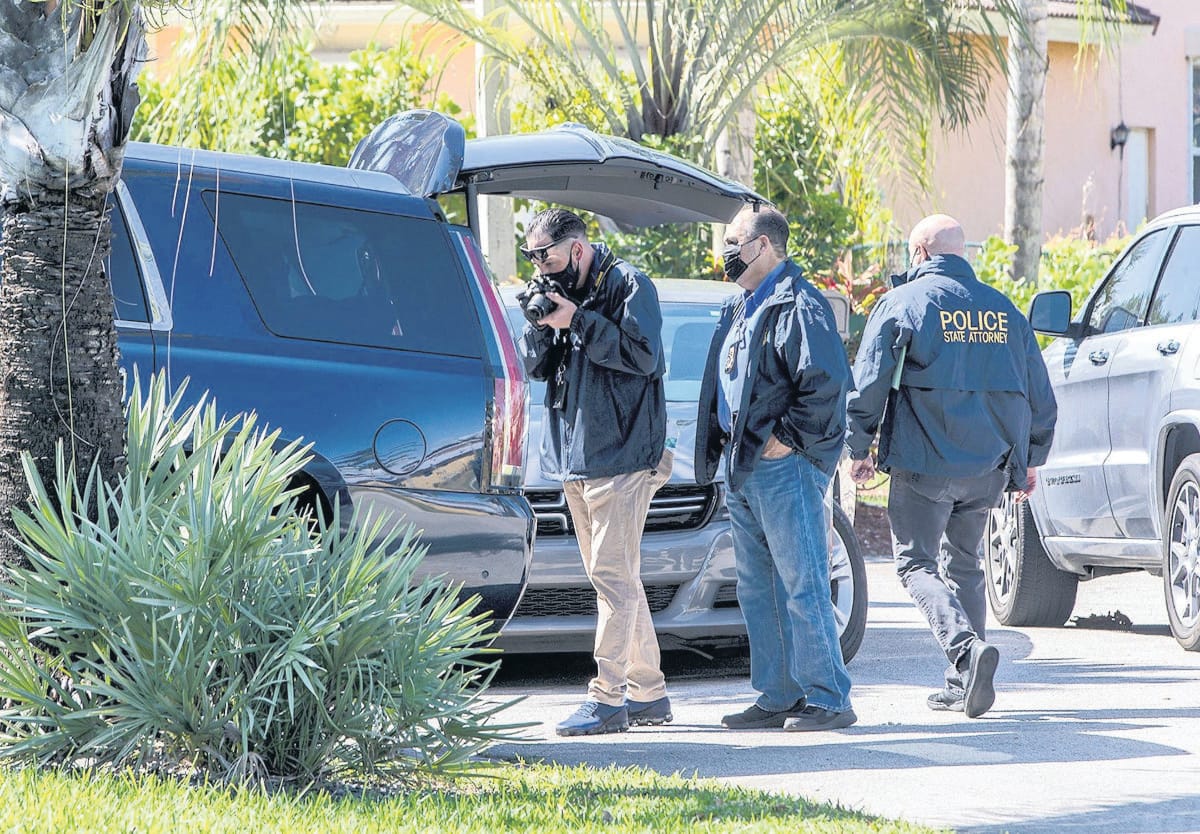
Bainter has never been charged with any crime, nor is he expected to be. He and the other political operatives who participated in the sprawling scandal, including those who worked for FPL, appear blameless in the eyes of federal and Florida election laws.
Bainter ignored multiple requests to comment for this story. The Florida Republican Senatorial Campaign Committee and its then-chairman, Agriculture Commissioner Wilton Simpson, who was incoming Senate president at the time, did not respond to detailed written questions.
Artiles inks deal
Artiles had been talking to Bainter about the District 37 race since at least October 2019, according to newly released emails. In the deposition, Bainter told prosecutors that he merely wanted Artiles to give him independent information about the critical race.
But then the two men signed a contract to manage “state legislative campaign assignments” after Artiles recruited a down-on-his-luck salesman of truck parts with the same last name as Rodriguez to challenge him.
Attached to the email in which Artiles attempted to land the lucrative $15,000-a month contract with Bainter is the first draft of a proposed contract between the ex-senator and the Florida Republican Senatorial Campaign Committee for “direction and assistance in developing the necessary programs to promote the Republican candidate for senator” for District 37.
The correspondence does not show whether that contract with the committee was executed, and it is not mentioned in the arrest warrant against Artiles. No Senate Republicans have been charged in the scandal.
Artiles would end up signing up with Bainter directly. As previously reported, the ex-senator billed Bainter’s firm, Data Targeting, for the cost of flying from Miami to Tallahassee to register Alex Rodriguez, the District 37 ghost candidate, in person.
Then Data Targeting wired $100,000 from a dark money tax-exempt group the company controlled to another dark money group, Florida Stronger, controlled by Artiles.
‘Put me in coach’
But over time, Bainter says he began distancing himself from Artiles, according to his deposition. The reason? Artiles’ now infamous inability to keep quiet.
“I learned from other people on the ground in Miami that Mr. Artiles … was suggesting to people that he had been hired to, quote, ‘run the campaigns down there,’ ” Bainter said.
Bainter felt Artiles had violated their contract’s confidentiality clause, according to the deposition. In an effort to avoid drama, Bainter said he kept paying Artiles — but started keeping him at arm’s length.
The plaintive tone of one undated email appears to show Artiles’ distress at being iced out. After giving Bainter pinpoint advice on the election, he signed the email, “Put me in coach.”

Then, on at least four separate occasions as the election approached, police reports indicate that Alex Rodriguez asked Artiles for money. Artiles gave him some $45,000 — even paying for the private school tuition of Rodriguez’s children with his credit card. Prosecutors say these payments were illegal campaign donations from Artiles’ group, Florida Stronger.
“This defendant, Artiles, had a contract with Data Targeting,” Tim VanderGiesen told Miami-Dade Circuit Court Judge Miguel De La O on Jan. 12 during a motion hearing about expert witnesses. “That’s where we intend to show the money came from.”
Artiles resigned from the Florida Senate in disgrace in 2017 after drunkenly using racial slurs in front of two Black colleagues, He pleaded not guilty to the 2021 charges. If convicted, Artiles faces up to five years in prison.
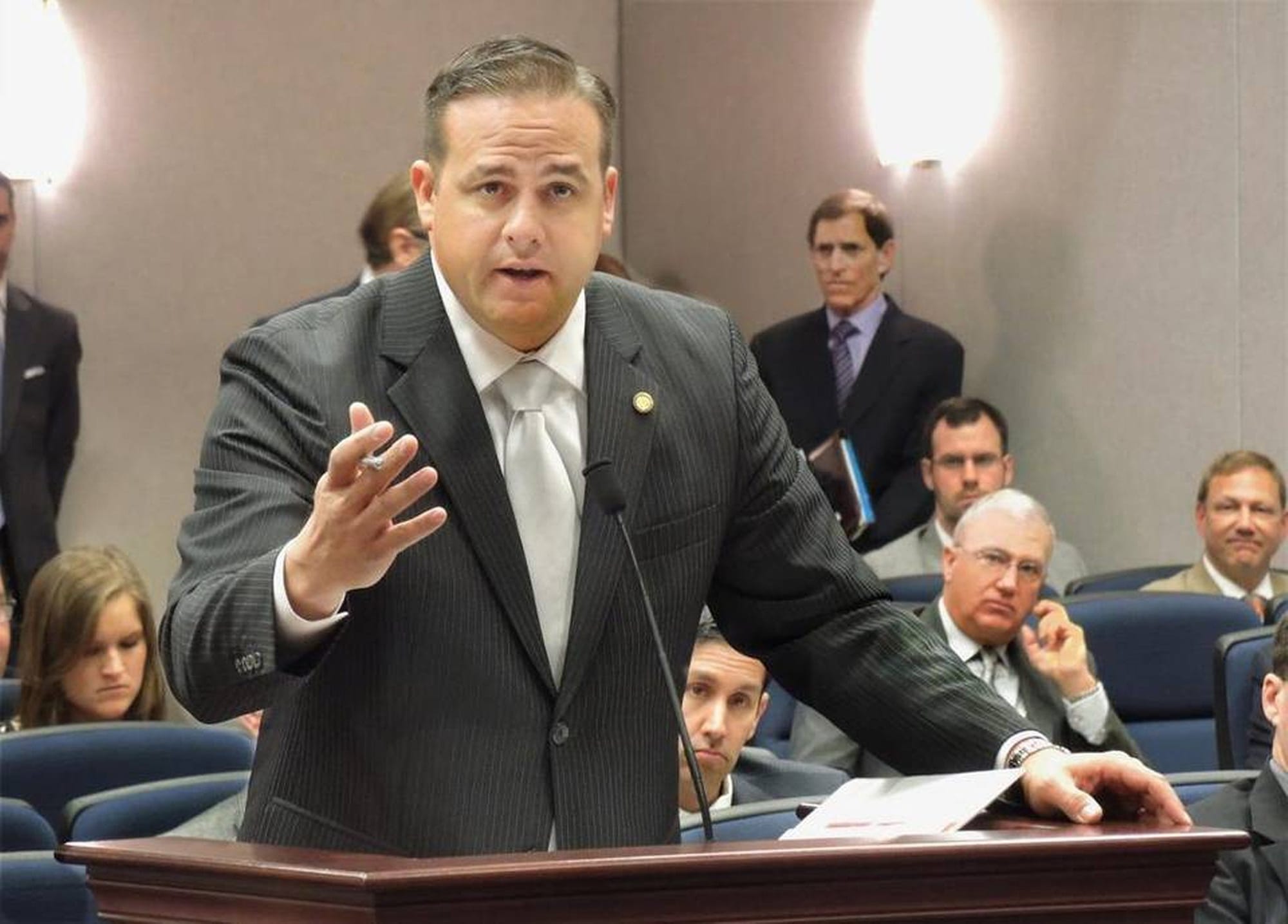
Rodriguez, the ghost candidate, pleaded guilty in August 2021. He received three years probation and agreed to cooperate with prosecutors. Two others indicted for alleged ghost candidate-related campaign finance violations await trial in central Florida.
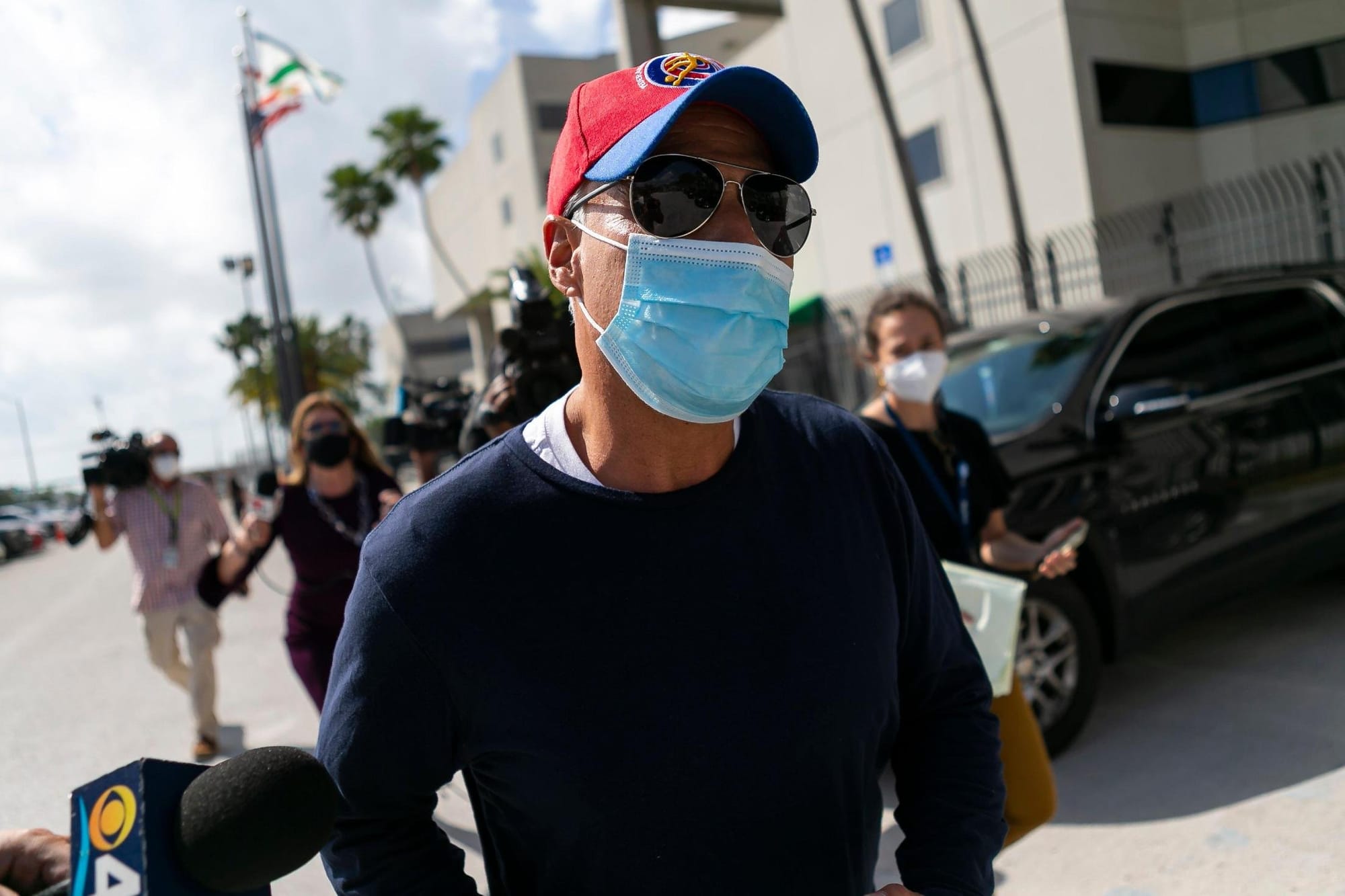
Power company sued over ‘ghost’ candidate scheme
According to a shareholder lawsuit filed against NextEra, the power company’s parent company, the CEO of Florida Power & Light and its in-house lobbying team worked closely with Alabama-based political consultants at Matrix LLC to promote the ghost candidates.

The consultants helped move $630,000 from a 501(c)(4) group controlled by the Florida Chamber of Commerce, a trade organization with close ties to FPL, through a daisy-chain of dark money groups and out to political committees that printed mail advertisements for the ghost candidates.
Though FPL insists that it did nothing more than support candidates aligned with its interests, the scandal contributed to the abrupt resignation of its CEO in January 2023. NextEra has moved to dismiss the shareholder suit. In another lawsuit, the founder of Matrix LLC charged that his CEO was operating as a “rogue employee” during this period.
Similar scenarios played out in 2018.
Matrix LLC had worked closely with Data Targeting in the 2018 South Miami mayoral race, operating as agents of an FPL-funded vendetta brought on by the incumbent mayor’s support of rooftop solar and his activism against a local nuclear power plant.
Both Matrix and Data Targeting also worked against 2018 Democratic Gainesville Senate candidate Kayser Enneking. In that race, Matrix used FPL funds to run a third-party candidate against Enneking. That candidate split the district’s Democratic vote, ensuring Enneking’s defeat.
“These are types of allegations and scandals that shatter the belief that this publicly regulated utility is a safe, secure, and non-volatile investment,” the shareholder lawsuit reads.
Added Democratic state Sen. Shevrin Jones: “Ever since Donald Trump lost, Republicans have been talking about election integrity. But when you look at this here, this is everything but election integrity.”


